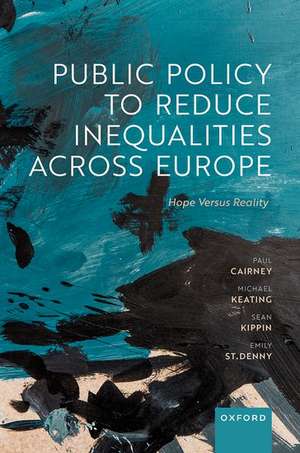Public Policy to Reduce Inequalities across Europe: Hope Versus Reality
Autor Paul Cairney, Michael Keating, Sean Kippin, Emily St Dennyen Limba Engleză Hardback – 25 aug 2022
Preț: 498.63 lei
Preț vechi: 612.47 lei
-19% Nou
Puncte Express: 748
Preț estimativ în valută:
95.44€ • 103.02$ • 80.02£
95.44€ • 103.02$ • 80.02£
Carte disponibilă
Livrare economică 17-24 martie
Preluare comenzi: 021 569.72.76
Specificații
ISBN-13: 9780192898586
ISBN-10: 0192898582
Pagini: 224
Dimensiuni: 160 x 240 x 17 mm
Greutate: 0.5 kg
Editura: OUP OXFORD
Colecția OUP Oxford
Locul publicării:Oxford, United Kingdom
ISBN-10: 0192898582
Pagini: 224
Dimensiuni: 160 x 240 x 17 mm
Greutate: 0.5 kg
Editura: OUP OXFORD
Colecția OUP Oxford
Locul publicării:Oxford, United Kingdom
Recenzii
European governments have sought to reduce economic and social inequality, with only modest success. This book explains why little change has occurred. It argues that inequality is a complex issue, with multiple origins and drivers that lead to unresolved debates...The authors examine inequities in education, health, and gender in great detail, and conclude by proposing a new approach to carrying out justice and equity policies.
I think this book is interesting material for scholars and professionals who wish to learn more about the complexity of policymaking to reduce health, gender, or educational inequalities. From a more general policy science perspective, the book offers a useful conceptual lens to study how sectoral and regional policies interact to produce intersectoral outcomes.
This book asks why governments in Europe have struggled to reduce inequalities. This book asks why governments in Europe have struggled to reduce inequalities...The conclusions call for a more realistic approach to policy analysis, one that avoids manuals of best practice and provides policy learnings from other countries as a model. Instead, policy analysis based on continuous reflections and an awareness of institutional and structural constraints will generate a greater appreciation of competing inputs in the policy process.
I think this book is interesting material for scholars and professionals who wish to learn more about the complexity of policymaking to reduce health, gender, or educational inequalities. From a more general policy science perspective, the book offers a useful conceptual lens to study how sectoral and regional policies interact to produce intersectoral outcomes.
This book asks why governments in Europe have struggled to reduce inequalities. This book asks why governments in Europe have struggled to reduce inequalities...The conclusions call for a more realistic approach to policy analysis, one that avoids manuals of best practice and provides policy learnings from other countries as a model. Instead, policy analysis based on continuous reflections and an awareness of institutional and structural constraints will generate a greater appreciation of competing inputs in the policy process.
Notă biografică
Paul Cairney is Professor of Politics and Public Policy, University of Stirling, UK (@Cairneypaul). His research spans comparisons of policy theories (Understanding Public Policy, 2020), and co-authored accounts of methods associated with key theories (Handbook of Complexity and Public Policy, 2015), international policy processes (Global Tobacco Control, 2012), and comparisons of UK and devolved policymaking (Why Isn't Government More Preventive?, 2020). He uses these insights to explain the use of evidence in policy and policymaking, in books (The Politics of Policy Analysis, 2021; The Politics of Evidence-Based Policy Making, 2016), articles, and blog posts: Michael Keating is Emeritus Professor of Politics at the University of Aberdeen and Fellow of the Royal Society of Edinburgh, British Academy, Academy of Social Sciences and European Academy. He graduated MA from the University of Oxford and PhD from what is now Glasgow Caledonian University. He has taught at universities in the United Kingdom and Canada and the European University Institute. Recent books include Rescaling the European State (OUP 2013) and State and Nation in the United Kingdom (OUP 2021).Sean Kippin is Lecturer in Public Policy at the University of Stirling. He is the author of a number of publications covering British political and policymaking institutions, the UK Labour Party, and policy areas such as education and inequalities. He has a PhD in Politics and Public Policy from the University of the West of Scotland, where he also held a succession of teaching roles. Prior to this, he worked for the London School of Economics on the Democratic Audit UK and LSE Politics and Policy Blog projects.Emily St.Denny is Assistant Professor in the Department of Political Science at the University of Copenhagen. She has previously worked as a Lecturer in Politics at the University of Stirling, and as a Research Assistant at the Public Policy Institute for Wales (Cardiff University) and at the Center on Constitutional Change (University of Stirling). She specialises in health policy and gender, and in the politics of policymaking in France and the devolved United Kingdom.
